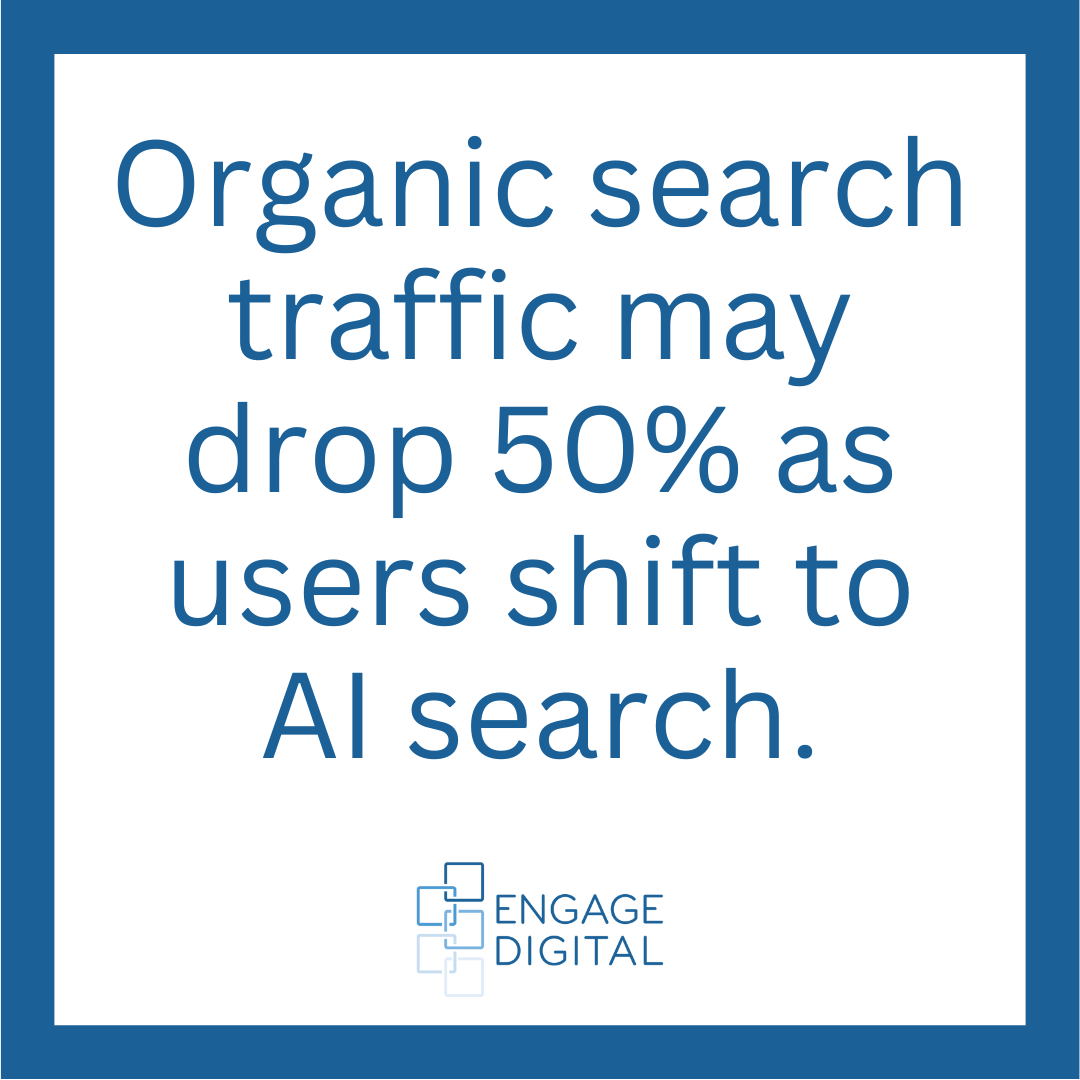If your business has recently seen a sharp decline in website visitors, you’re not alone. Across the United States, websites have experienced an average drop of nearly 60% in organic search traffic. Globally, the decline stands at approximately 52%. This isn’t an isolated incident; it’s a widespread trend affecting businesses across various industries.
The digital landscape is undergoing a seismic shift. AI-driven search tools, such as ChatGPT and Google’s AI Overviews, reshape how users interact with search engines. Instead of clicking through to websites, users now receive direct answers on the search results page. This phenomenon, known as “zero-click searches,” has become increasingly prevalent. According to Gartner, by 2028, brands’ organic search traffic will decrease by 50% or more as consumers embrace generative AI-powered search.
AI Impact on Search Behavior
Artificial intelligence is fundamentally altering how users interact with search engines. Tools like ChatGPT, Perplexity, and Google’s Search Generative Experience (SGE) now provide direct, AI-generated answers at the top of search results. This shift reduces the need for users to click through to individual websites, leading to a significant increase in “zero-click searches.” As a result, traditional organic search traffic is declining.
The implications for businesses are substantial. Gartner predicts that in 2026, traditional search engine volume will drop by an additional 25% as users turn to AI chatbots and virtual agents for information. According to industry experts, this trend is further exacerbated by Google’s SGE, which could slash publishers’ organic search traffic by another 20% to 60%, potentially leading to a $2 billion annual shortfall in ad revenues. These developments underscore the urgent need for businesses to adapt their digital strategies to remain visible in an increasingly AI-dominated search landscape.
Content Saturation: The Double-Edged Sword of AI
The explosion of AI-generated content has inundated the internet, leading to an oversaturation of information. This deluge makes it increasingly difficult for individual websites to achieve prominent rankings in search results. Moreover, Google’s AI Overviews now occupy substantial space on search engine results pages (SERPs), pushing traditional organic listings further down.
A study by BrightEdge revealed that AI Overviews can occupy up to 800 pixels on the SERP, significantly reducing the visibility of organic results. BrightEdge. This shift has profound implications for businesses striving to maintain online visibility. The dominance of AI-generated content and features like AI Overviews necessitates reevaluating SEO strategies to adapt to the evolving digital landscape.
Additional Factors Contributing to Organic Traffic Decline
Beyond AI advancements and content saturation, other elements have influenced the drop in organic search traffic:
Algorithm Updates: Google’s frequent algorithm changes, including spam updates, have penalized low-quality content and unnatural backlink profiles, leading to traffic drops for affected sites. These updates increasingly reward sites with original, authoritative content and natural link-building strategies.
Mobile-First Indexing: With Google’s shift to mobile-first indexing, websites that aren’t optimized for mobile devices may experience decreased visibility and traffic. Mobile usability, loading speed, and responsive design directly impact search rankings, especially as more users access smartphone content.
Strategies for Businesses to Enhance SEO in the Current Landscape
While returning to previous traffic levels may be unrealistic, businesses can implement strategies to improve their current SEO performance:
Optimize for AI-Powered Search: Create content that directly answers user queries concisely and is structured. Utilize clear headings, bullet points, and FAQs to increase the chances of being featured in AI-generated responses. Incorporating conversational keywords can also align your content with how users phrase questions in AI or voice searches.
Focus on High-Quality, Authoritative Content: Ensure your content demonstrates expertise, authoritativeness, and trustworthiness (E-A-T). Avoid thin or duplicate content, and provide comprehensive information that adds value to the reader. Cite credible sources, update outdated posts, and aim for depth over volume.
Enhance User Experience: Improve site speed, ensure mobile responsiveness, and create an intuitive navigation structure. A positive user experience can lead to longer site visits and higher engagement, favorable signals for search rankings. Use tools like Google PageSpeed Insights to identify and fix performance issues.
Leverage Structured Data and Schema Markup: Implementing schema markup helps search engines understand your content better, increasing the likelihood of being featured in rich snippets or AI summaries. Consider using JSON-LD format for clarity and consistency.
Diversify Traffic Sources: While focusing on SEO, invest in other channels like social media, email marketing, and paid advertising to drive traffic and reduce reliance on organic search alone. Building a well-rounded digital presence increases visibility and resilience to search engine fluctuations.
Embracing the New Normal
Businesses must recognize that the digital landscape has evolved dramatically. The rise of AI, changing user behavior, and shifting search engine algorithms mean that traditional SEO tactics may no longer yield the same results. Rather than aiming to recapture past traffic levels, businesses must pivot their mindset and adapt to the realities of today’s online ecosystem.
Instead of chasing outdated benchmarks, the focus should shift to optimizing the present environment. Embracing AI-friendly content formats, improving site usability, and diversifying traffic sources are now crucial for long-term success. By implementing the abovementioned strategies, businesses can weather the changes and position themselves for sustainable growth in the era of AI-driven search and intelligent content delivery.






